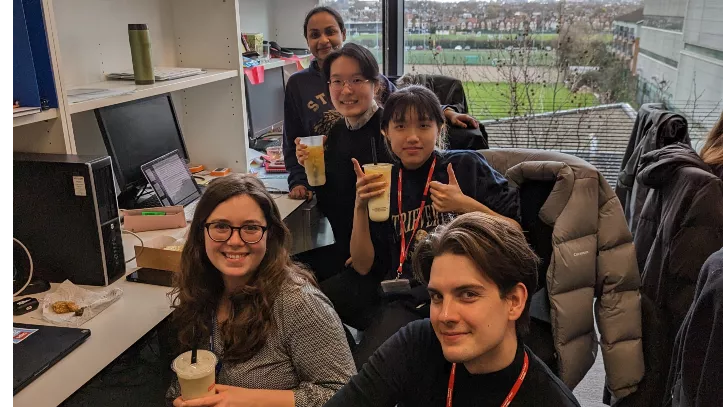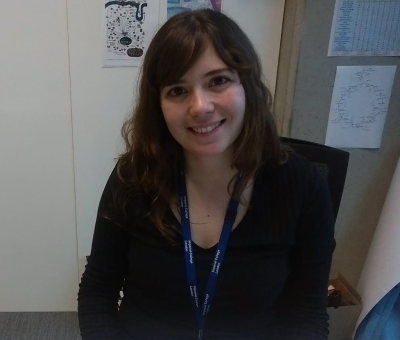
Our vision of world where diabetes can do no harm can only be reached by investing in ground-breaking research. Now we’re handing the microphone to one of our brilliant scientists, as she discusses her current project and beyond.

Dr Aida Martinez-Sanchez is a Lecturer in the Department of Metabolism, Digestion and Reproduction at Imperial College London (her team, pictured).
With our funding she’s investigating how insulin-making beta cells work, and why they go wrong in people living with type 2 diabetes.
Dr Martinez-Sanchez said:
"I have always been very curious about how living things work. This drove me to study for a PhD in Biochemistry and Molecular Biology back in Spain where I grew up. It was then when I first learnt about microRNAs.
"These are teeny tiny RNA molecules that we all have inside our cells. Being so small, their existence and importance had remained hidden for many years, but around the time I was immersed in my PhD we had learnt that these small but powerful molecules played very important roles in telling the cells what components to have and how to behave."
Tiny molecules - huge impact
Dr Martinez-Sanchez explained:
"I started my own independent research group in 2017 with the goal of finding out which of the hundreds of different microRNAs play a part in how beta cells make insulin and are damaged.
"I also want to figure out how to interfere with microRNAs and the processes they regulate, including their effects on mitochondria, so we can improve how beta cells function."
Mitochondria are structures inside cells that work like tiny engines, releasing energy to help the cells to do their jobs. In beta cells, the mitochondria have another important role, telling the cells when and how to release the right amount of insulin.
Having high blood sugar levels over a long period of time can have an impact on how well they’re able to do this, meaning beta cells start to make even less insulin and type 2 diabetes can get worse over time.
With her PhD student Sunehera Sarwat, Dr Martinez-Sanchez is delving deeper.
Lab-based limitations
Dr Martinez-Sanchez described some of the challenges she faces in her work:
"Beta cells are tricky to work with. In the lab, we often use "cell lines" which are cells that have been tweaked from "original" cells we have in our bodies. So they can be grown forever and be efficiently used to do experiments and test theories.
"Unfortunately, there are hardly any cell lines that function at all like real human beta cells. And we have to make sure that what we discover in the lab is still true in the context of a whole human being.
"This makes experiments a bit more challenging, but also pushes us to be more creative in the way we design our projects."
Dr Martinez-Sanchez’s work could also help us better understand how existing treatments for type 2 diabetes work and how to improve them, to make sure more people living with the condition have healthy blood sugar levels and a much lower risk of developing diabetes complications.
We asked Dr Martinez-Sanchez what she finds most fulfilling about her research:
"I guess my main motivation is curiosity and the firm belief that understanding how cells work is the key to being capable of making them work “better”, so we can improve the lives of people living with diabetes in the long term.
"On a more practical note, being a researcher means working hard, but flexibly, and it is also such a rewarding job at so many levels. I get to interact with diverse, interesting, and different people on a daily basis. Every day I get to learn new things and, at the same time, to teach and contribute to shaping the next generations of scientists."
Outside of the lab
Originally from Santander in Northern Spain, Dr Martinez-Sanchez is proud to have won awards for her tortillas de patata (Spanish omelette):
"This was in my early twenties, when I beat a bunch of life-experienced summer-campers from a small village I was visiting in Asturias (also in Northern Spain)."
When she’s not drinking foamy lattes or walking by the sea in her hometown, she loves getting lost in old and new places. She said:
"I have a little 3-year-old, so these days I spend a lot of time in parks and playgrounds. Thankfully London has many of those! Spending time doing things with friends and family is what I value the most."
Dr Martinez-Sanchez is also incredibly grateful to all the supporters of Diabetes UK. Your generosity allows Dr Martinez-Sanchez and her committed colleagues to pursue their passions, searching for answers to some of the biggest questions in diabetes research.
"I’d like to emphasise how truly remarkable Diabetes UK’s broad vision and dedication is, to cure diabetes and improve the lives of people living with this condition. to Investing in early-stage research, as well as supporting projects that directly benefit patients in the clinic are both essential to fully tackle diabetes in the long-term.
"I’d like to extend my sincerest thanks to all the supporters of Diabetes UK for their important contributions which allow Diabetes UK to support the diabetes community – both patients and professionals – in such numerous ways."
Find out more about the research projects we’re funding here.
